Title
Objects of Common Interest: Hard, Soft, and All Lit Up with Nowhere to GoDuration
15 September 2021 to 22 February 2022Venue
Noguchi MuseumOpening Hours
Wed–Sun 11 a.m.–6 p.m.Location
Telephone
+1 718 204 7088| Detailed Information | |||||
|---|---|---|---|---|---|
| Title | Objects of Common Interest: Hard, Soft, and All Lit Up with Nowhere to Go | Duration | 15 September 2021 to 22 February 2022 | Venue | Noguchi Museum |
| Opening Hours | Wed–Sun 11 a.m.–6 p.m. | Location |
9-1 33rd Road New York, NY 11106
United States | Telephone | +1 718 204 7088 |
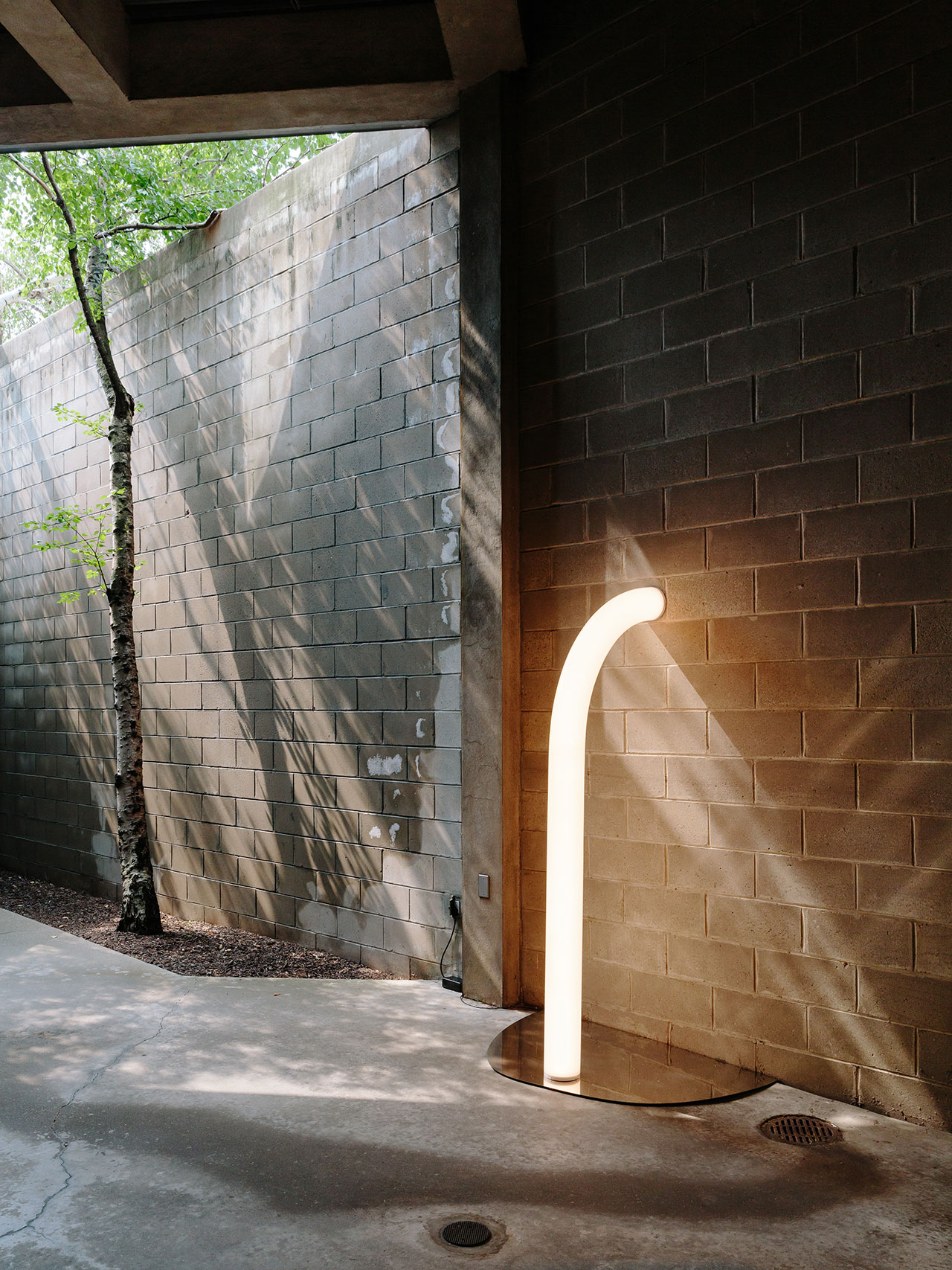
Installation view. "Objects of Common Interest: Hard, Soft, and All Lit Up with Nowhere to Go", Noguchi Museum, New York. Photography by Brian W. Ferry. Artworks © Objects of Common Interest and © The Isamu Noguchi Foundation and Garden Museum / Artists Rights Society
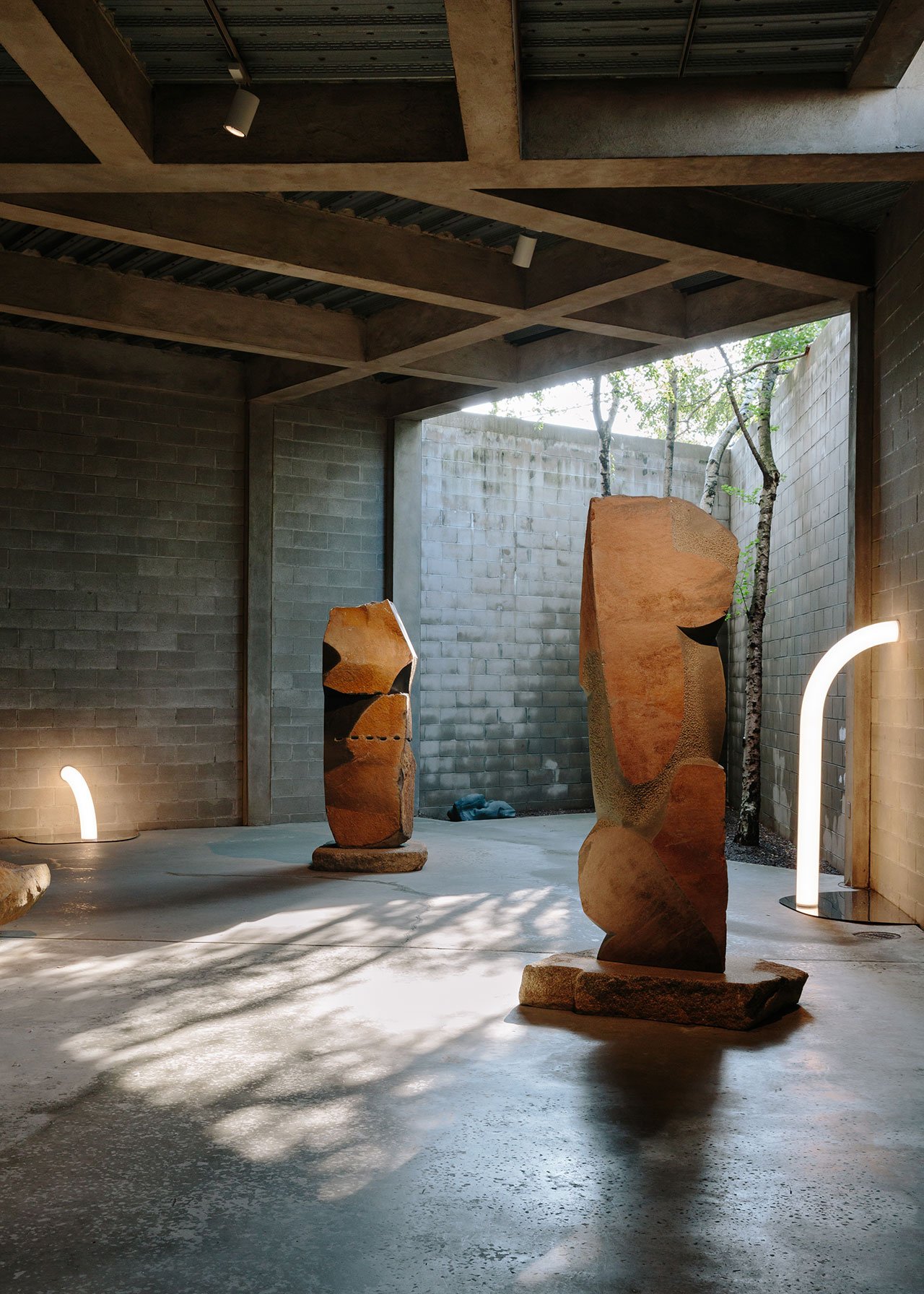
Installation view. "Objects of Common Interest: Hard, Soft, and All Lit Up with Nowhere to Go", Noguchi Museum, New York. Photography by Brian W. Ferry. Artworks © Objects of Common Interest and © The Isamu Noguchi Foundation and Garden Museum / Artists Rights Society
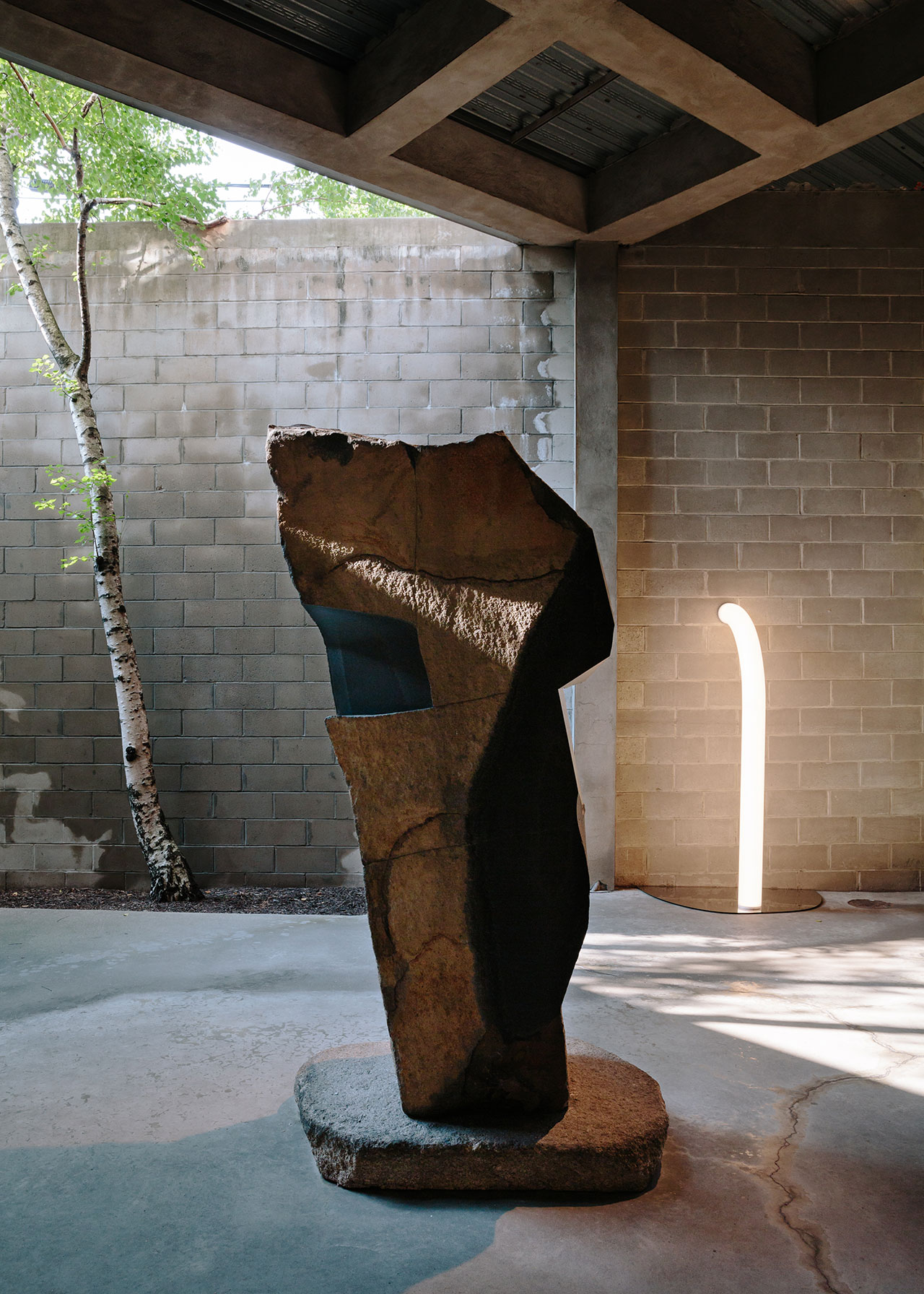
Installation view. "Objects of Common Interest: Hard, Soft, and All Lit Up with Nowhere to Go", Noguchi Museum, New York. Photography by Brian W. Ferry. Artworks © Objects of Common Interest and © The Isamu Noguchi Foundation and Garden Museum / Artists Rights Society
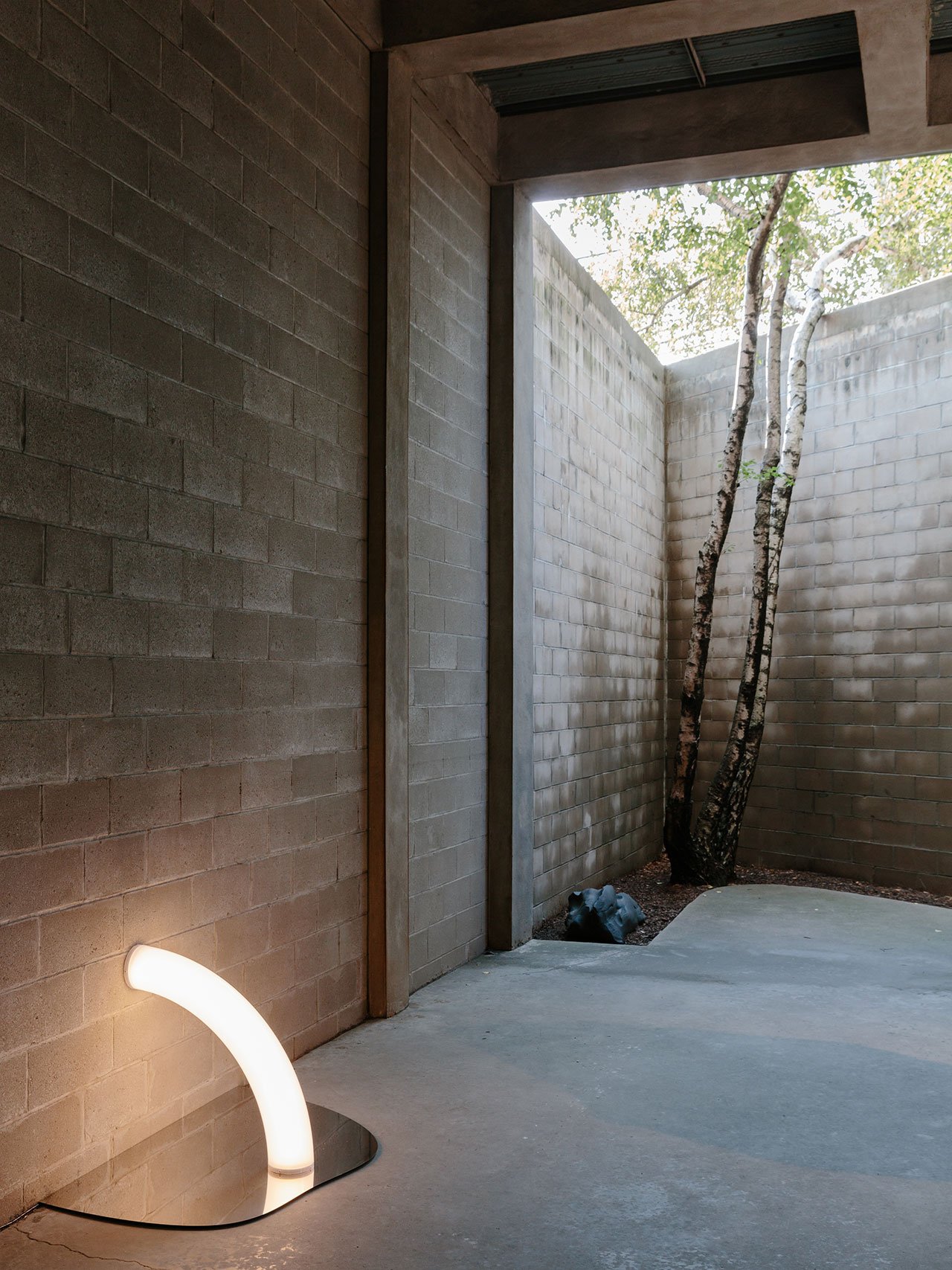
Installation view. "Objects of Common Interest: Hard, Soft, and All Lit Up with Nowhere to Go", Noguchi Museum, New York. Photography by Brian W. Ferry. Artworks © Objects of Common Interest and © The Isamu Noguchi Foundation and Garden Museum / Artists Rights Society
Senior curator Dakin Hart has thoughtfully interspersed OoCI’s furniture, limited series and unique objects throughout the museum, from the ivy-covered walled garden, to the ground floor permanent installation, to the upper floor galleries which host “Useless Architecture”, a temporary exhibition exploring how Noguchi drew on architecture to deepen the civic, communal, and environmental aspect of his sculptures. Combining older and newer pieces from OoCI’s portfolio, the exhibition not only draws parallels between Noguchi and OoCI’s ideas and practice but also evocatively highlights their shared affinity for blurring the distinctions between art and design.
As one of the twentieth century’s most acclaimed artists, Isamu Noguchi was also one of the most prolific having created, during his 80-year career, sculptures, gardens, furniture, lighting (most notably the iconic Akari lamps), ceramics, architecture and set designs such as those for acclaimed choreographer Martha Graham. Firmly uninterested in labels, Noguchi believed there was no fixed hierarchical relationship between the disciplines. Known for his abstract organic shapes, his creative practice was powered by an intuitive drive for exploring formal possibilities rather than producing a specific result, a fundamental tenet shared by Petaloti and Trampoukis. “We always assign a label, a role onto an object”, but “it is often the case that the use changes through the design process to production”, they explained to Yatzer in a previous interview. “A stool can be a side table, a sculptural piece, or an abstract snapshot from a larger installation”. Working with notions of flexibility, ambiguity, illusion or de-familiarization, OoCi’s work echoes Noguchi’s intuitive approach to design in the way he valued form over clarity and inherent usefulness over an explicit or marketable purpose.
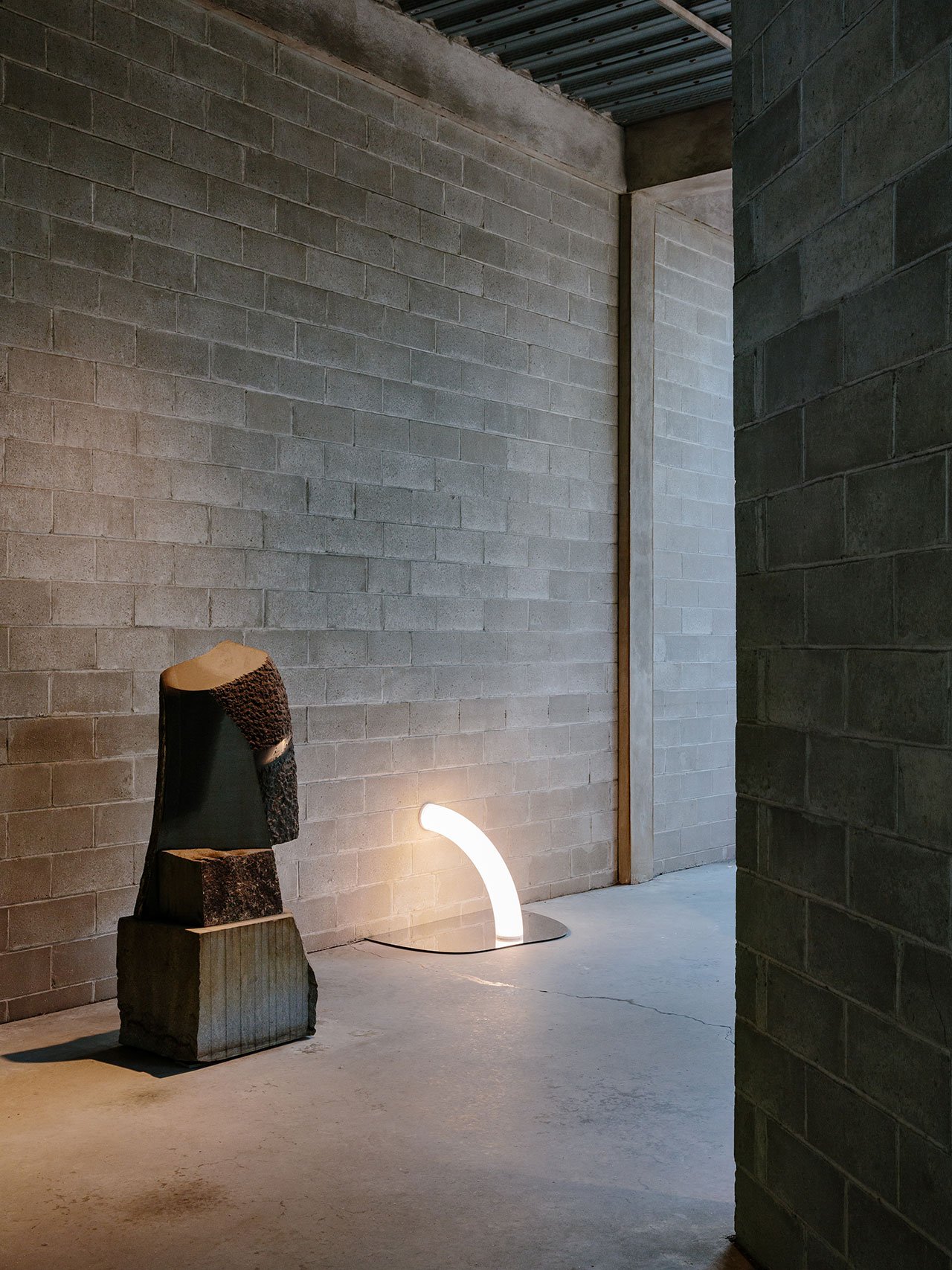
Installation view. "Objects of Common Interest: Hard, Soft, and All Lit Up with Nowhere to Go", Noguchi Museum, New York. Photography by Brian W. Ferry. Artworks © Objects of Common Interest and © The Isamu Noguchi Foundation and Garden Museum / Artists Rights Society
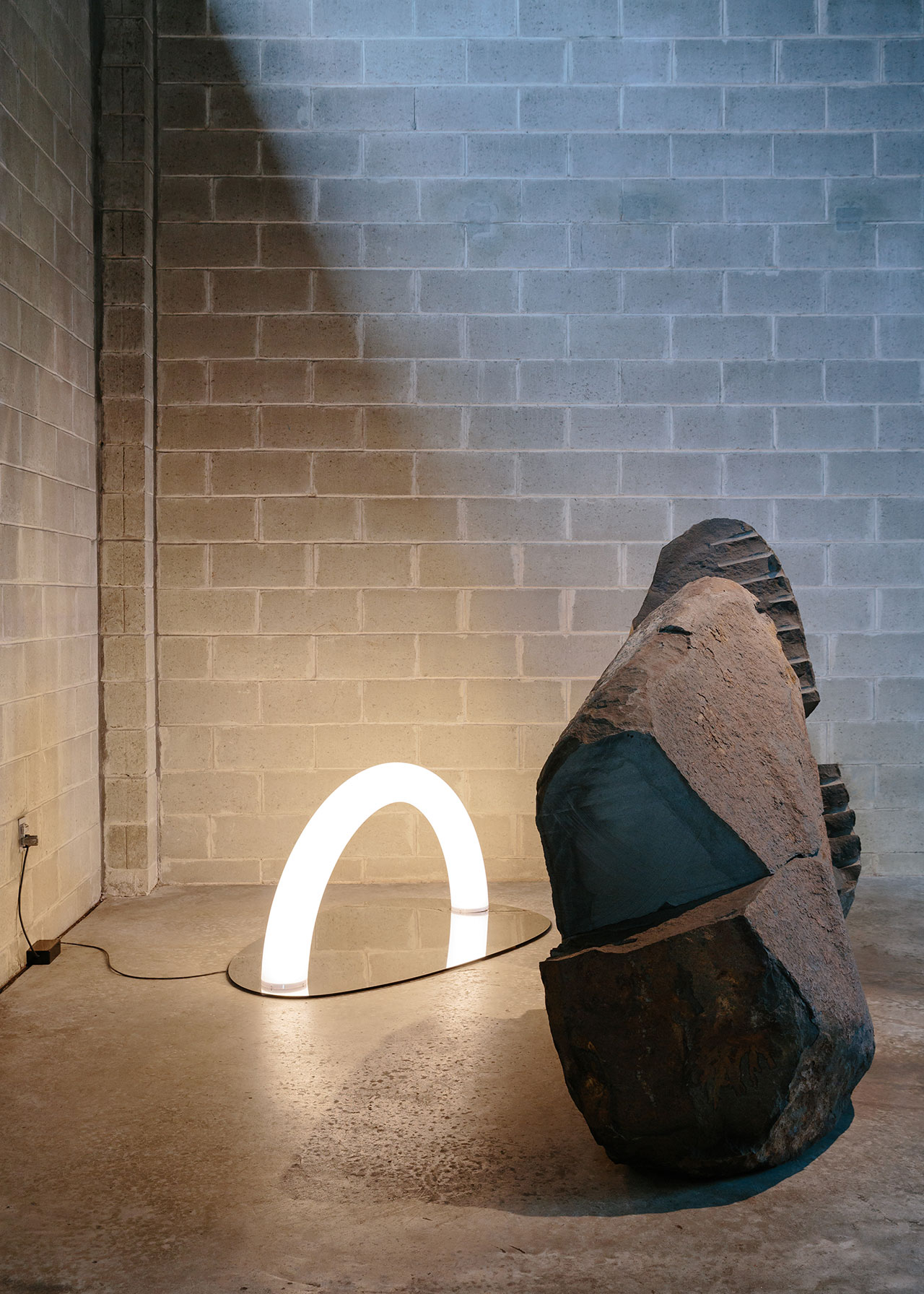
Installation view. "Objects of Common Interest: Hard, Soft, and All Lit Up with Nowhere to Go", Noguchi Museum, New York. Photography by Brian W. Ferry. Artworks © Objects of Common Interest and © The Isamu Noguchi Foundation and Garden Museum / Artists Rights Society
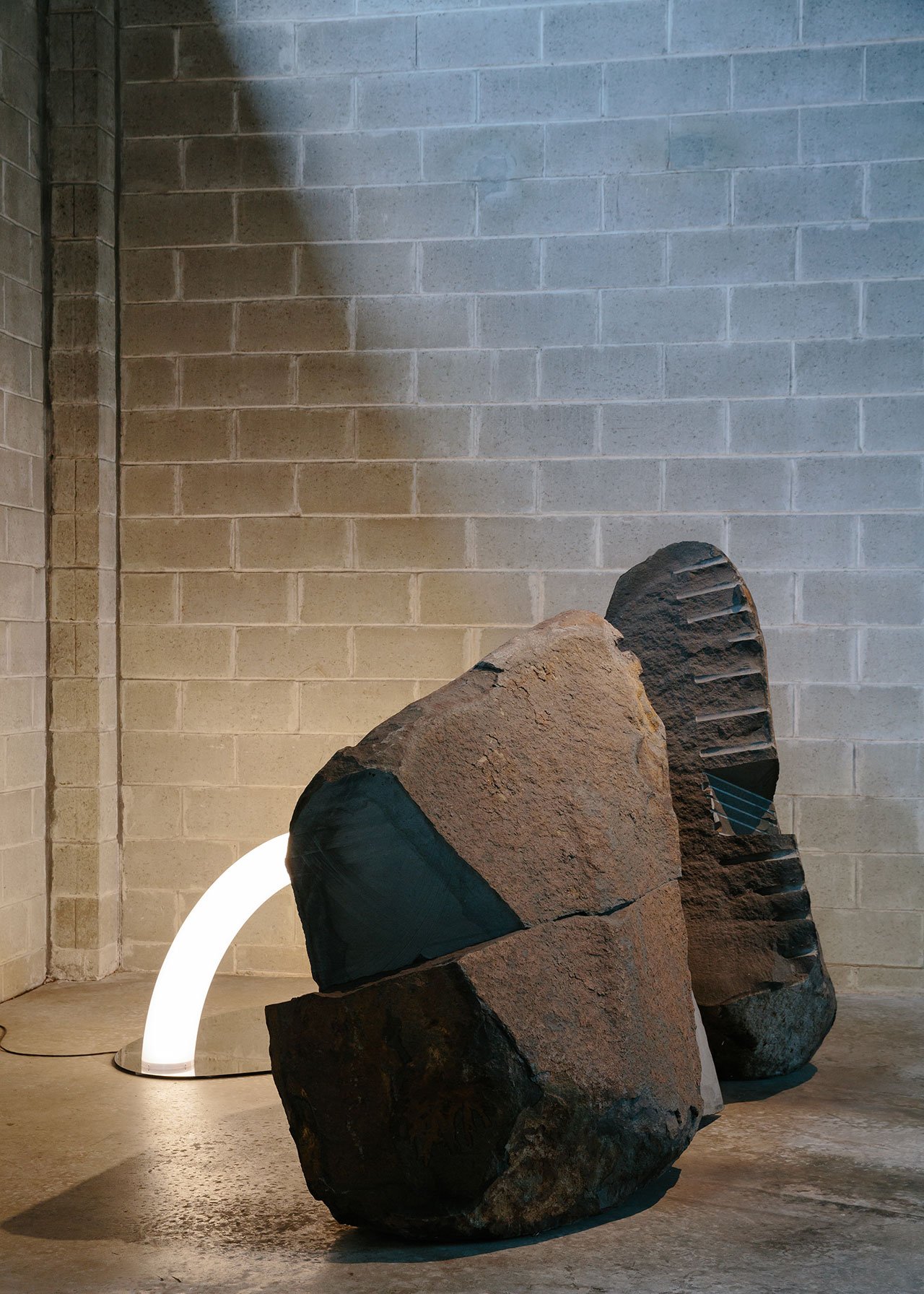
Installation view. "Objects of Common Interest: Hard, Soft, and All Lit Up with Nowhere to Go", Noguchi Museum, New York. Photography by Brian W. Ferry. Artworks © Objects of Common Interest and © The Isamu Noguchi Foundation and Garden Museum / Artists Rights Society
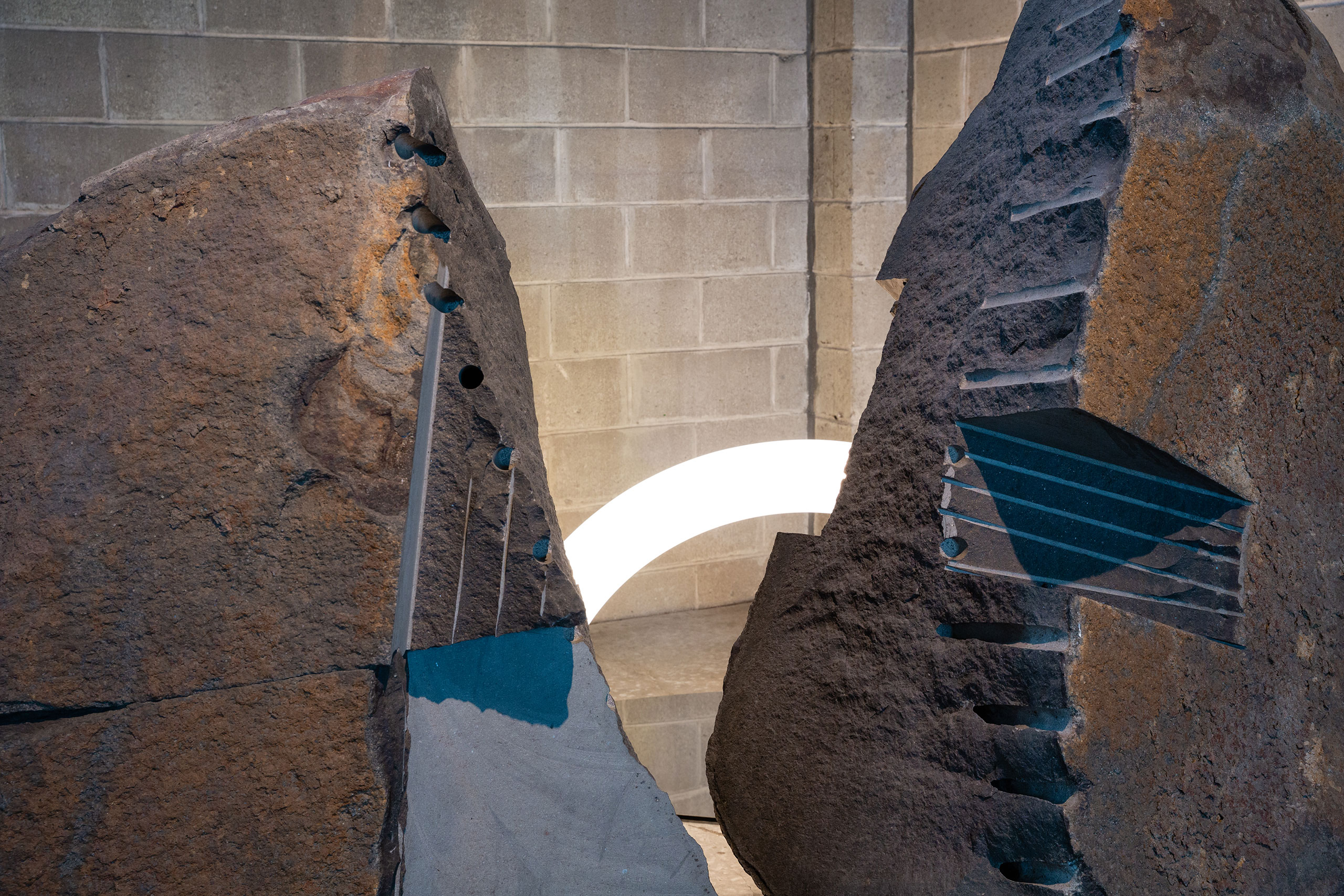
Installation view. "Objects of Common Interest: Hard, Soft, and All Lit Up with Nowhere to Go", Noguchi Museum, New York. Photography by Brian W. Ferry. Artworks © Objects of Common Interest and © The Isamu Noguchi Foundation and Garden Museum / Artists Rights Society
Noguchi’s dual heritage (his mother was American, his father Japanese) underpins another touchpoint between the late sculptor and the Greek design duo. “As Greek designers and architects living and working in New York we share - with Noguchi - the in-betweenness of two worlds” Petaloti and Trampoukis explain. Living and working between East and West, with studios in New York, Japan and Italy, Noguchi continually absorbed inspiration from a global perspective, from Brancusi’s abstraction and Surrealist biomorphism, to ancient Greek sculpture. The latter attests to a significant connection between Noguchi and Greece, his “intellectual home” as he once described it, which goes much deeper than the artist’s admiration for the country’s classical heritage and use of Penteli white marble, which he had shipped to his studio from Athens, “tapping into the transformative relationship between him, the place, and its people” in Petaloti and Trampoukis’ words.
In the museum’s indoor/outdoor gallery, the primordial forms of Noguchi’s basalt sculptures are paired with the geometric simplicity of the Tube Light series, OoCI’s first light project featuring glowing curved shapes that appear to be pliant and soft. Terminating on puddle-like, mirror-polished, stainless-steel bases, OoCI’s sculptural lights seem to extend into the ground and walls. Experienced together, Noguchi’s sculptures and OoCI’s objects read as an interplay of contradictions (rough/smooth, dark/light, heavy/light, organic/artificial), and yet stand in harmony comprising an otherworldly landscape, both prehistoric and modern.
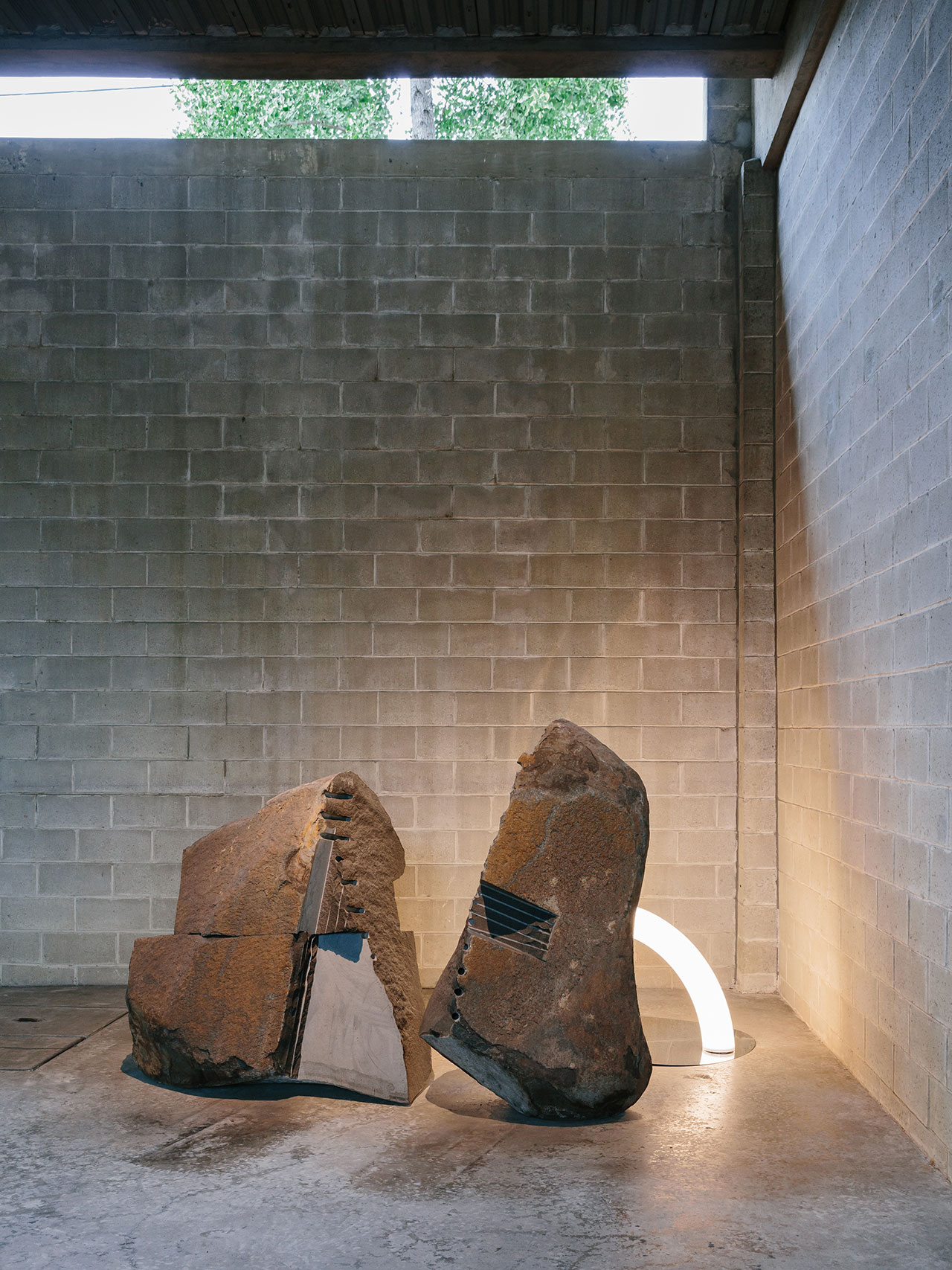
Installation view. "Objects of Common Interest: Hard, Soft, and All Lit Up with Nowhere to Go", Noguchi Museum, New York. Photography by Brian W. Ferry. Artworks © Objects of Common Interest and © The Isamu Noguchi Foundation and Garden Museum / Artists Rights Society
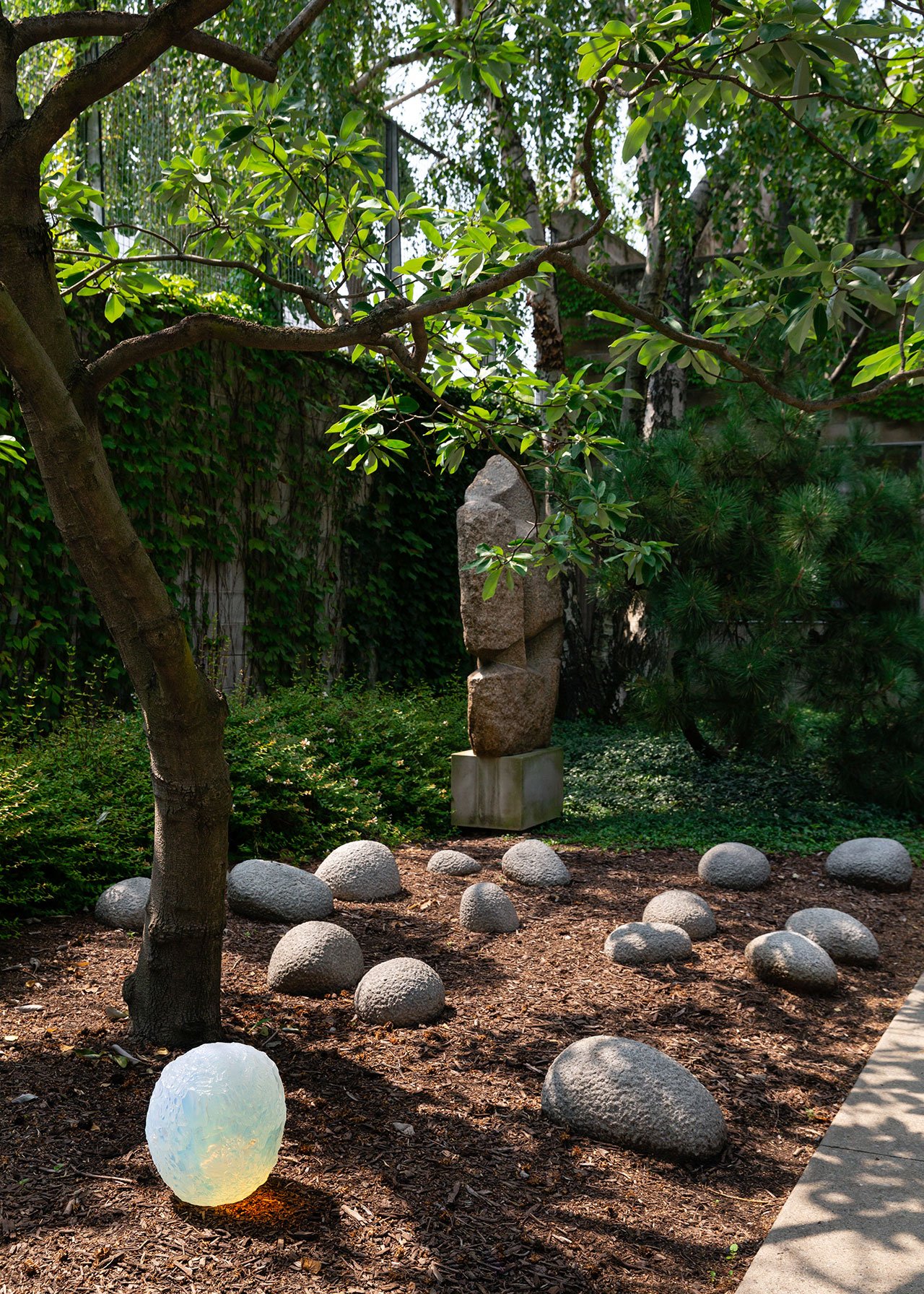
Installation view. "Objects of Common Interest: Hard, Soft, and All Lit Up with Nowhere to Go", Noguchi Museum, New York. Photography by Brian W. Ferry. Artworks © Objects of Common Interest and © The Isamu Noguchi Foundation and Garden Museum / Artists Rights Society
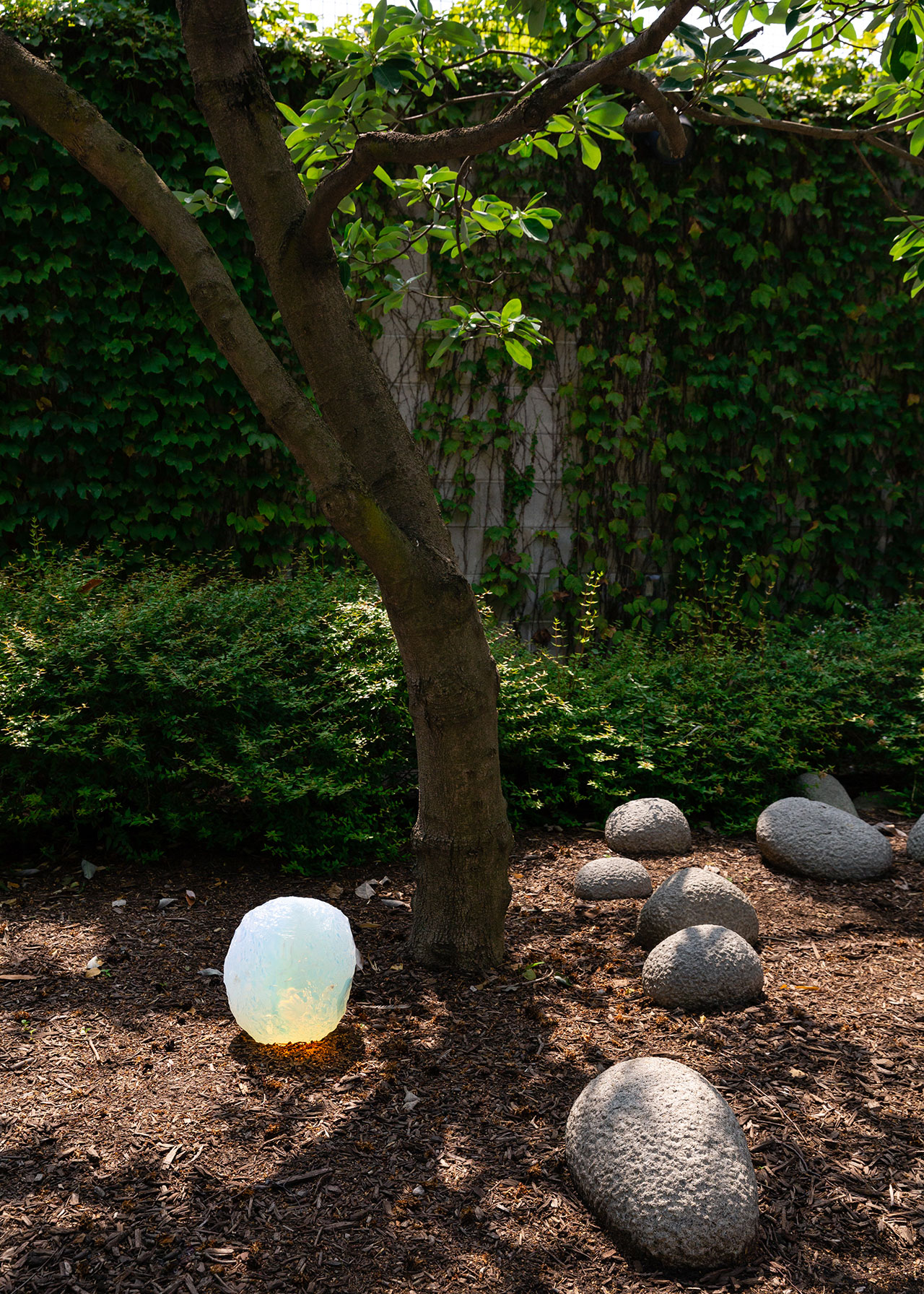
Installation view. "Objects of Common Interest: Hard, Soft, and All Lit Up with Nowhere to Go", Noguchi Museum, New York. Photography by Brian W. Ferry. Artworks © Objects of Common Interest and © The Isamu Noguchi Foundation and Garden Museum / Artists Rights Society
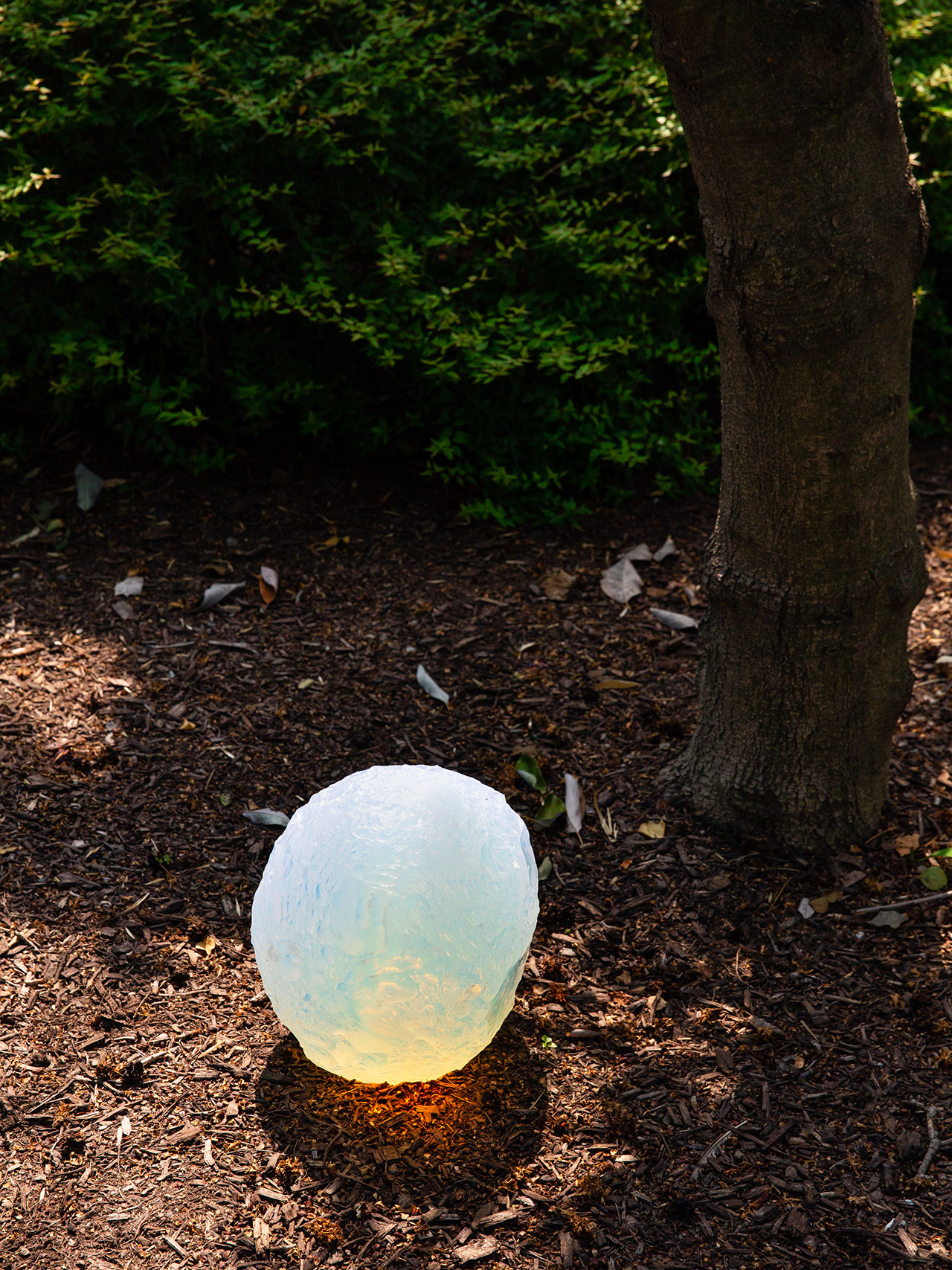
Installation view. "Objects of Common Interest: Hard, Soft, and All Lit Up with Nowhere to Go", Noguchi Museum, New York. Photography by Brian W. Ferry. Artworks © Objects of Common Interest and © The Isamu Noguchi Foundation and Garden Museum / Artists Rights Society
This kind of playful choreography of seemingly contrasting yet soulfully kindred pieces runs throughout the exhibition. In the museum’s rock garden, OoCI’s acrylic-cast Offerings–Rock III and inflatable Standing Stones are nestled amongst Noguchi’s stone sculptures including Practice Rocks in Placement, an artistic-cum-landscaping installation conceived by Noguchi as an exercise in the placement of rocks. Taking the form of rocks and boulders, OoCI’s work playfully subverts their formal naturalness with their luminosity and transparency, in juxtaposition to Noguchi’s sculptures.
On the museum’s upper floor, OoCI’s Formations series are interspersed among Noguchi’s pillar and totem-like sculptures in the context of the Useless Architecture concurrent exhibition. Rendered in a vibrant cobalt blue, OoCI’s glossy, curvy-shaped objects stand out among the muted colour palette and natural textures of Noguchi’s work, but at the same time fit right in, courtesy of their ambiguity of form and purpose.
Finally, in the Lounge area, OoCI’s voluptuous Tube Chair, Inflatable Lights and Tube Lights echo the curvaceous forms of Noguchi’s Freeform Sofa & Ottoman and Coffee Table, which were designed for Herman Miller in the 1940s and reissued by Vitra in 2002, along with his famous Akari lamps, and granite sculptures, while the translucent forms of OoCI’s Rock Seats and Rock Side Tables converse with Noguchi’s basalt Garden Seat and galvanized steel pieces.
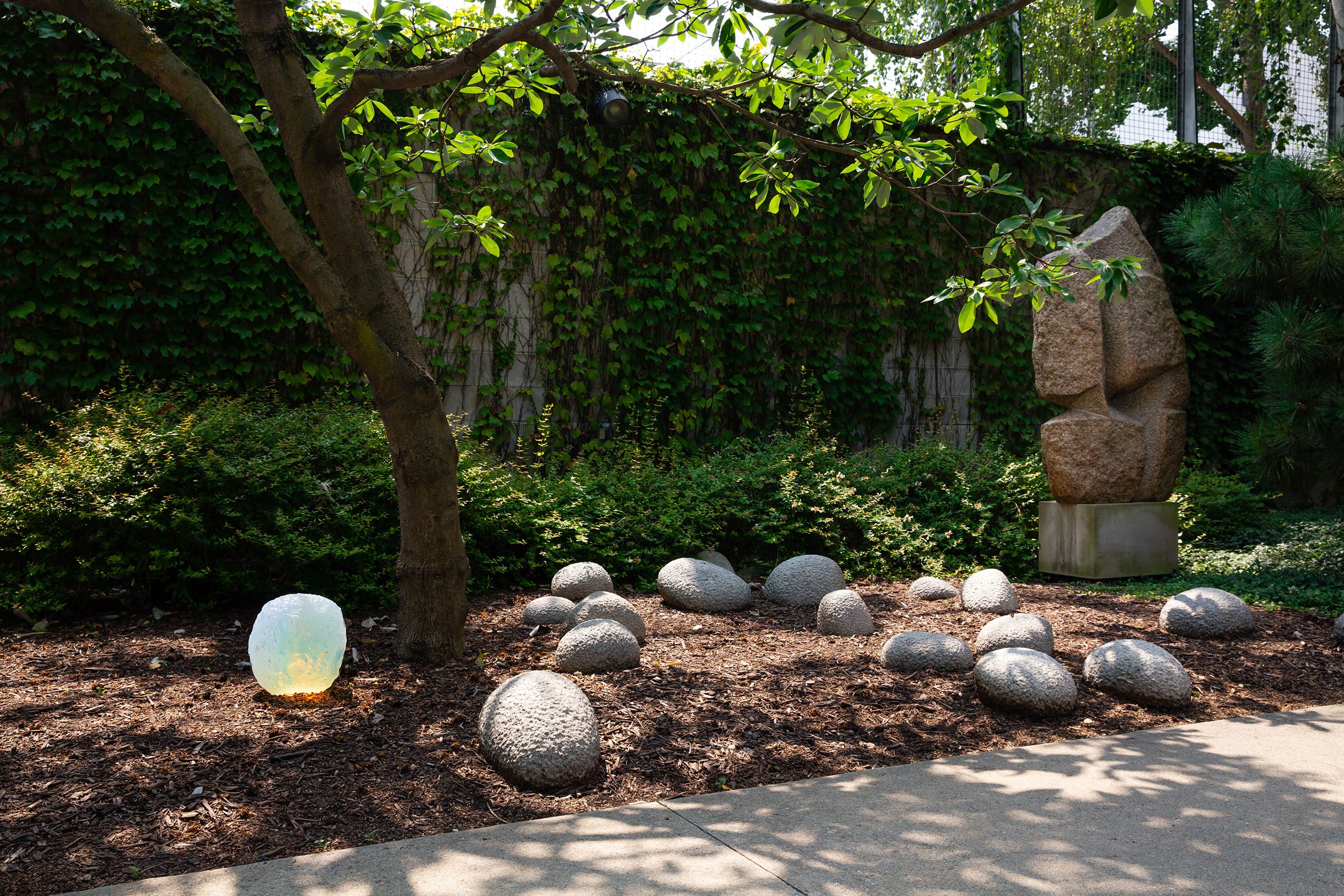
Installation view. "Objects of Common Interest: Hard, Soft, and All Lit Up with Nowhere to Go", Noguchi Museum, New York. Photography by Brian W. Ferry. Artworks © Objects of Common Interest and © The Isamu Noguchi Foundation and Garden Museum / Artists Rights Society
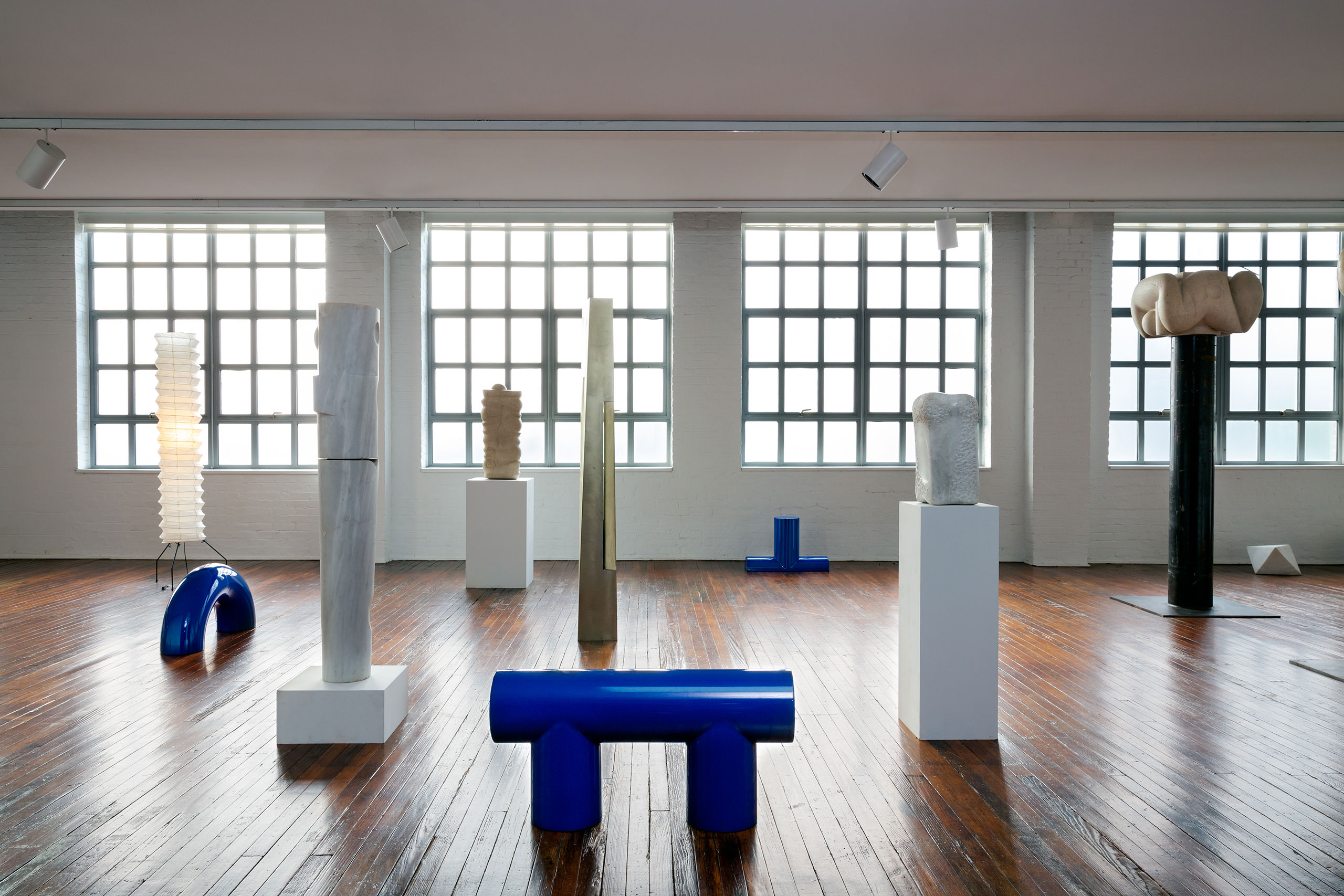
Installation view. "Objects of Common Interest: Hard, Soft, and All Lit Up with Nowhere to Go", Noguchi Museum, New York. Photography by Brian W. Ferry. Artworks © Objects of Common Interest and © The Isamu Noguchi Foundation and Garden Museum / Artists Rights Society
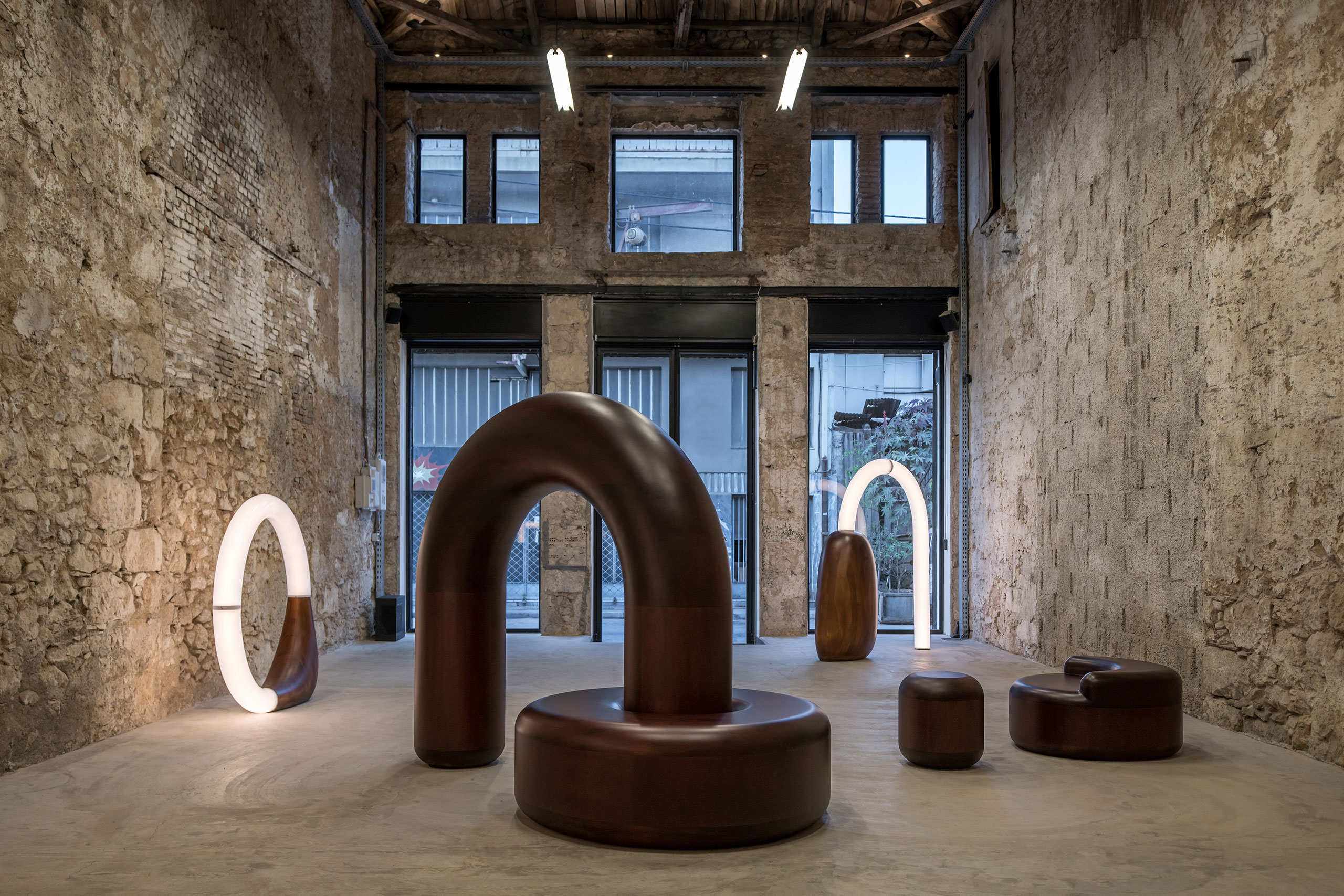
Installation view. VOLAX at Carwan Gallery, Athens. Photography by Giorgos Sfakianakis.
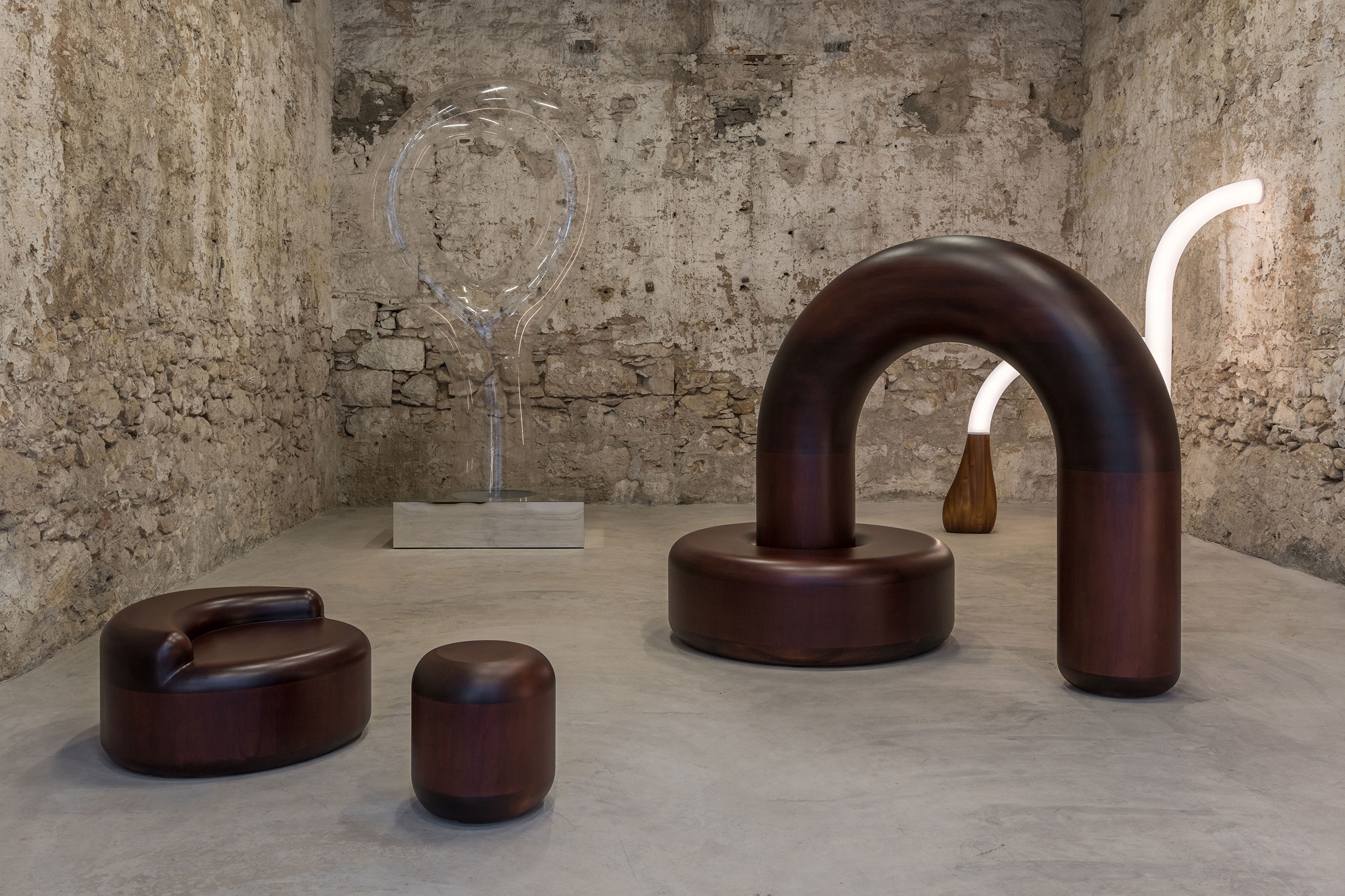
Installation view. VOLAX at Carwan Gallery, Athens. Photography by Giorgos Sfakianakis.
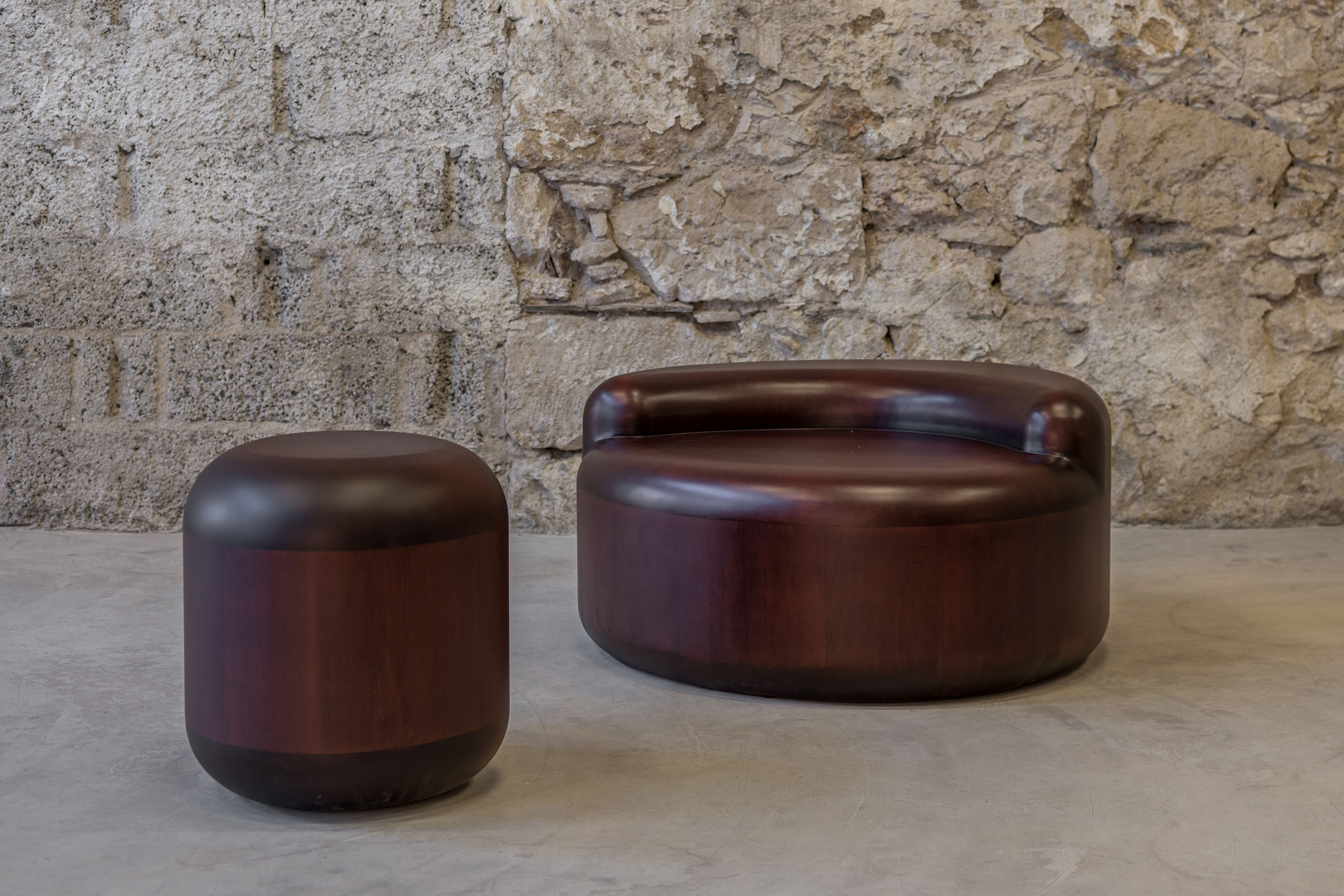
Installation view. VOLAX at Carwan Gallery, Athens. Photography by Giorgos Sfakianakis.
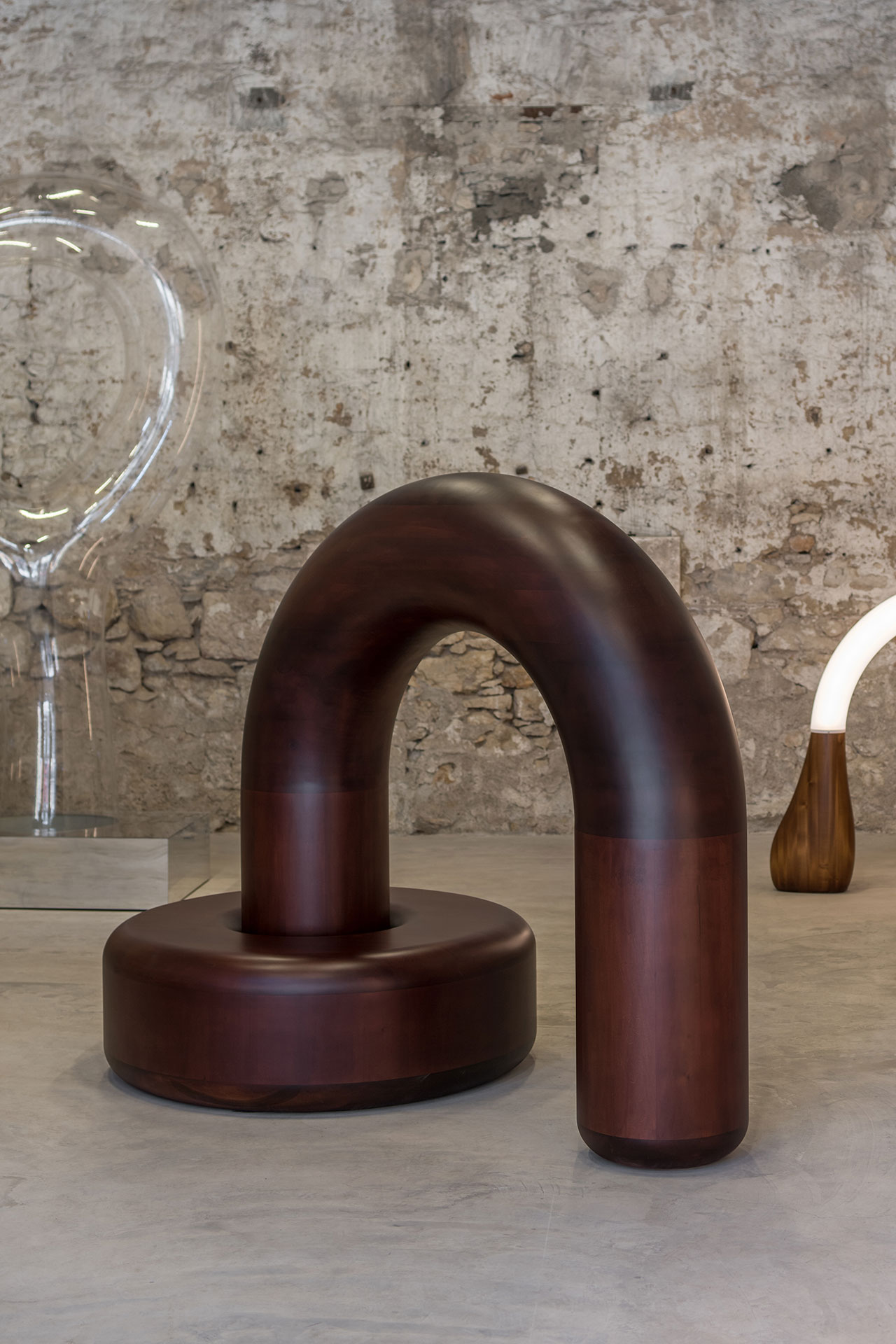
Installation view. VOLAX at Carwan Gallery, Athens. Photography by Giorgos Sfakianakis.
While the anthological exhibition at the Noguchi Museum effectively functions as an impromptu retrospective of OoCI’s practice, another exhibition currently running at Carwan Gallery in Athens, Greece, presents the studio’s latest work. Named after a village on the Cycladic island of Tinos, “Volax” consists of life-size lighting and seating pieces inspired by the large granite boulders that dot the village’s wind-swept landscape. The collection marks the studio’s first ever use of wood, featuring a series of low chairs, benches and side tables whose abstract, geometric forms and monolithic design defy categorization. Monumental yet playful, primitive yet sophisticated, the pieces comprise a sui generis sculptural garden amid the gallery’s crumbling industrial setting, creating in Petaloti and Trampoukis’ words “moments of unfamiliar simplicity”.
The exhibition further highlights the design duo’s creative exploration of their Greek heritage, but also serves as a reminder of the importance that they bestow on the exposure of their work to unexpected public behaviour, which brings us right back to Noguchi — his definition of sculpture was directly related to the lived experience, a concept underpinning his commitment to public spaces and his idea to design the Noguchi Museum in the first place.
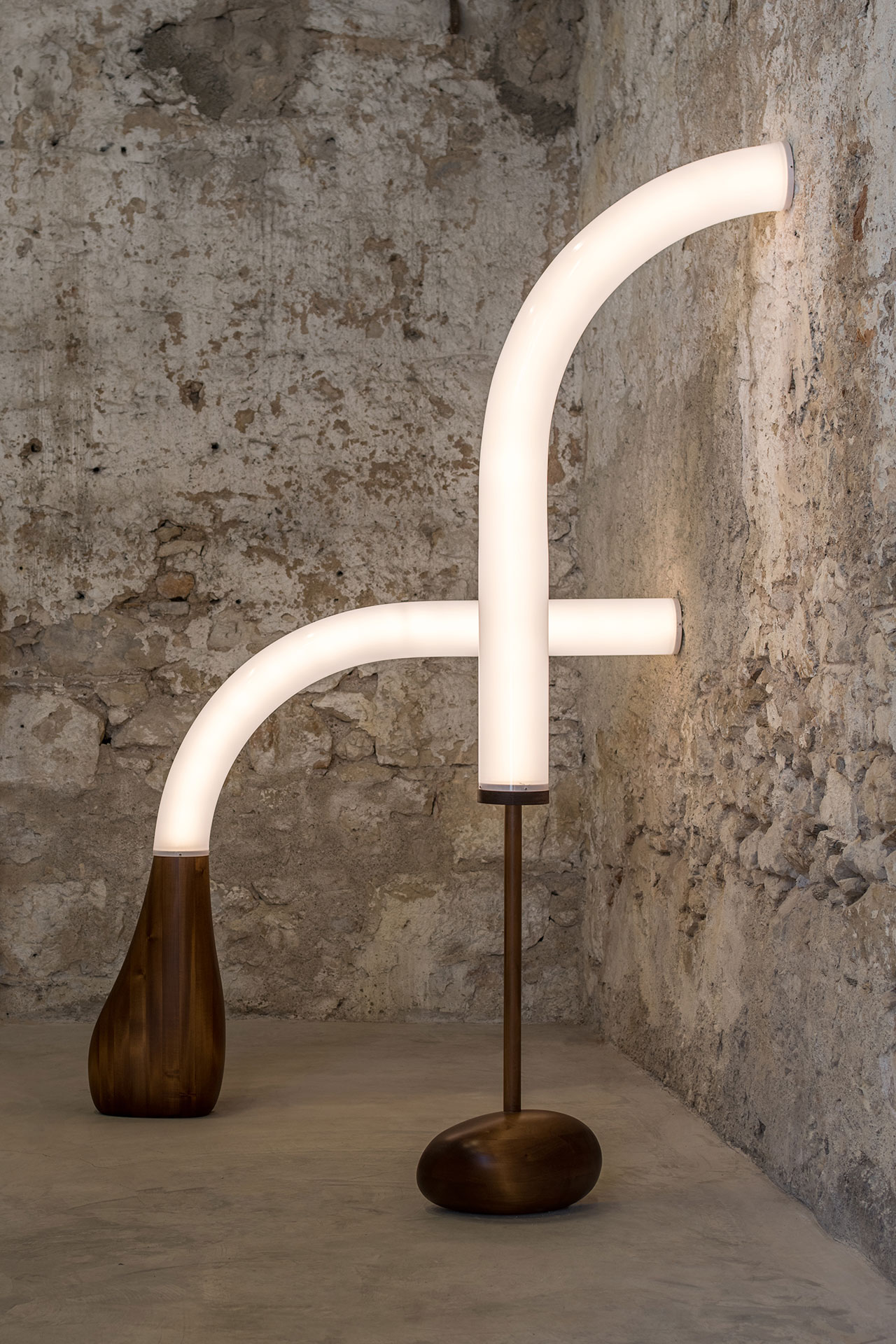
Installation view. VOLAX at Carwan Gallery, Athens. Photography by Giorgos Sfakianakis.
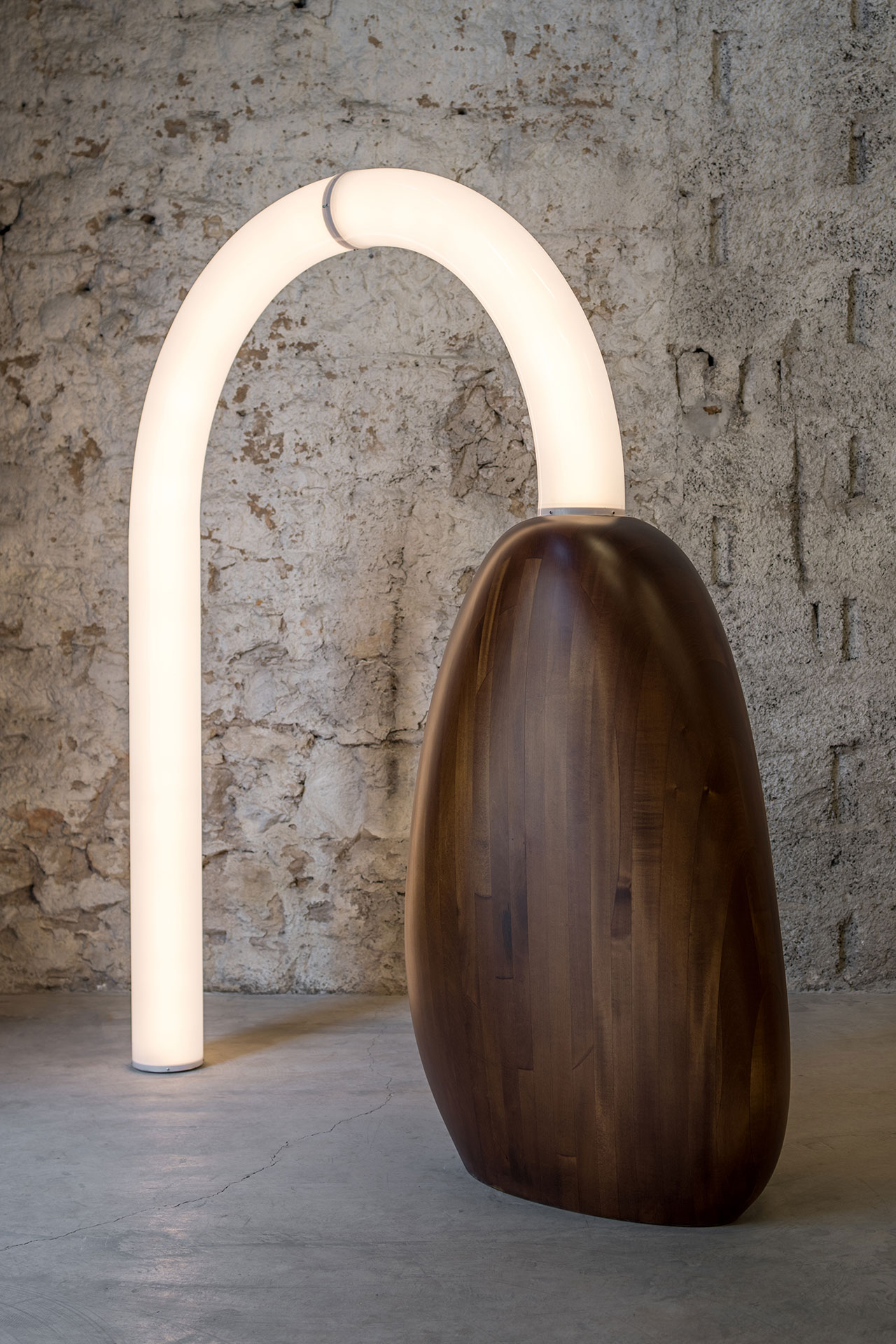
Installation view. VOLAX at Carwan Gallery, Athens. Photography by Giorgos Sfakianakis.
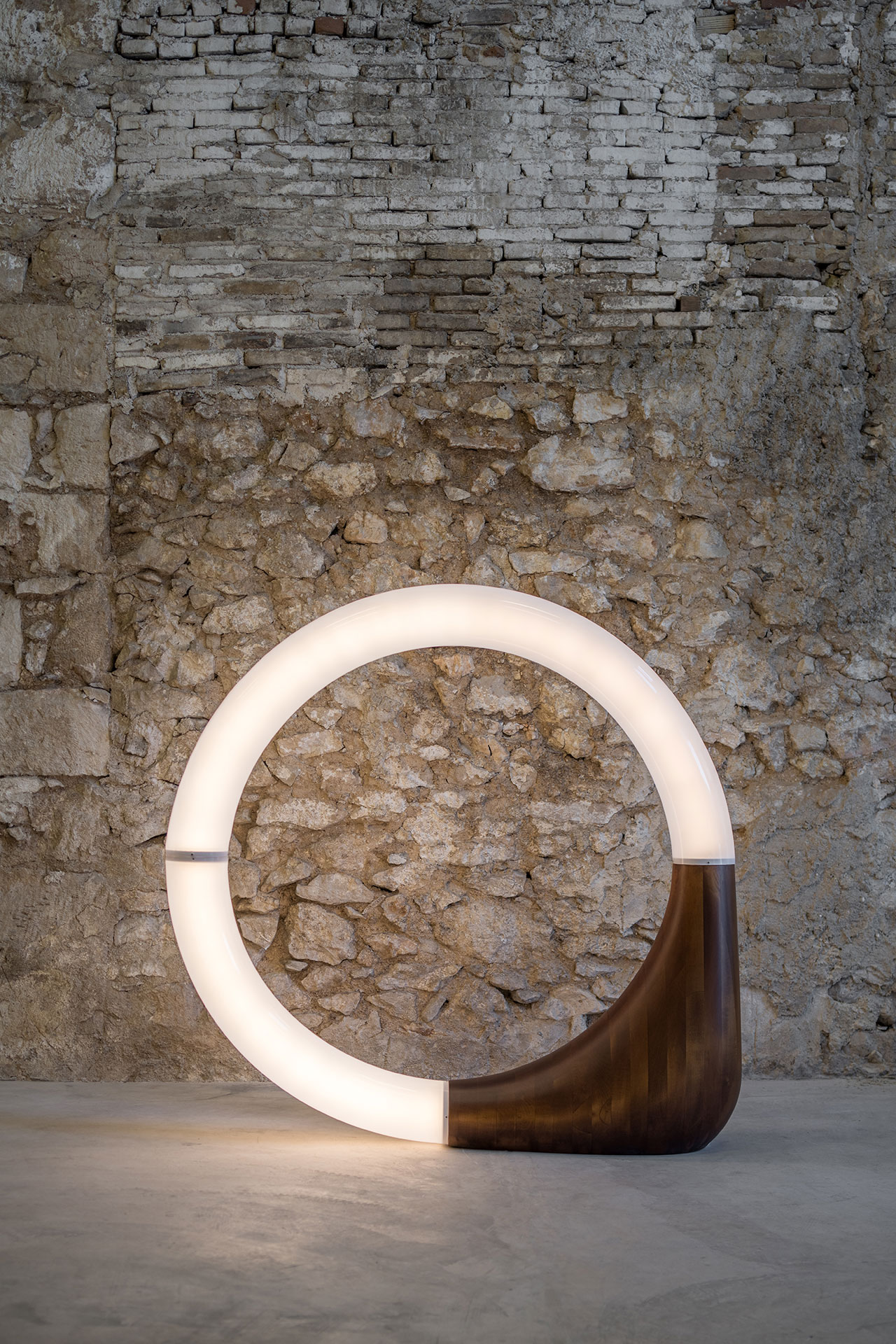
Installation view. VOLAX at Carwan Gallery, Athens. Photography by Giorgos Sfakianakis.
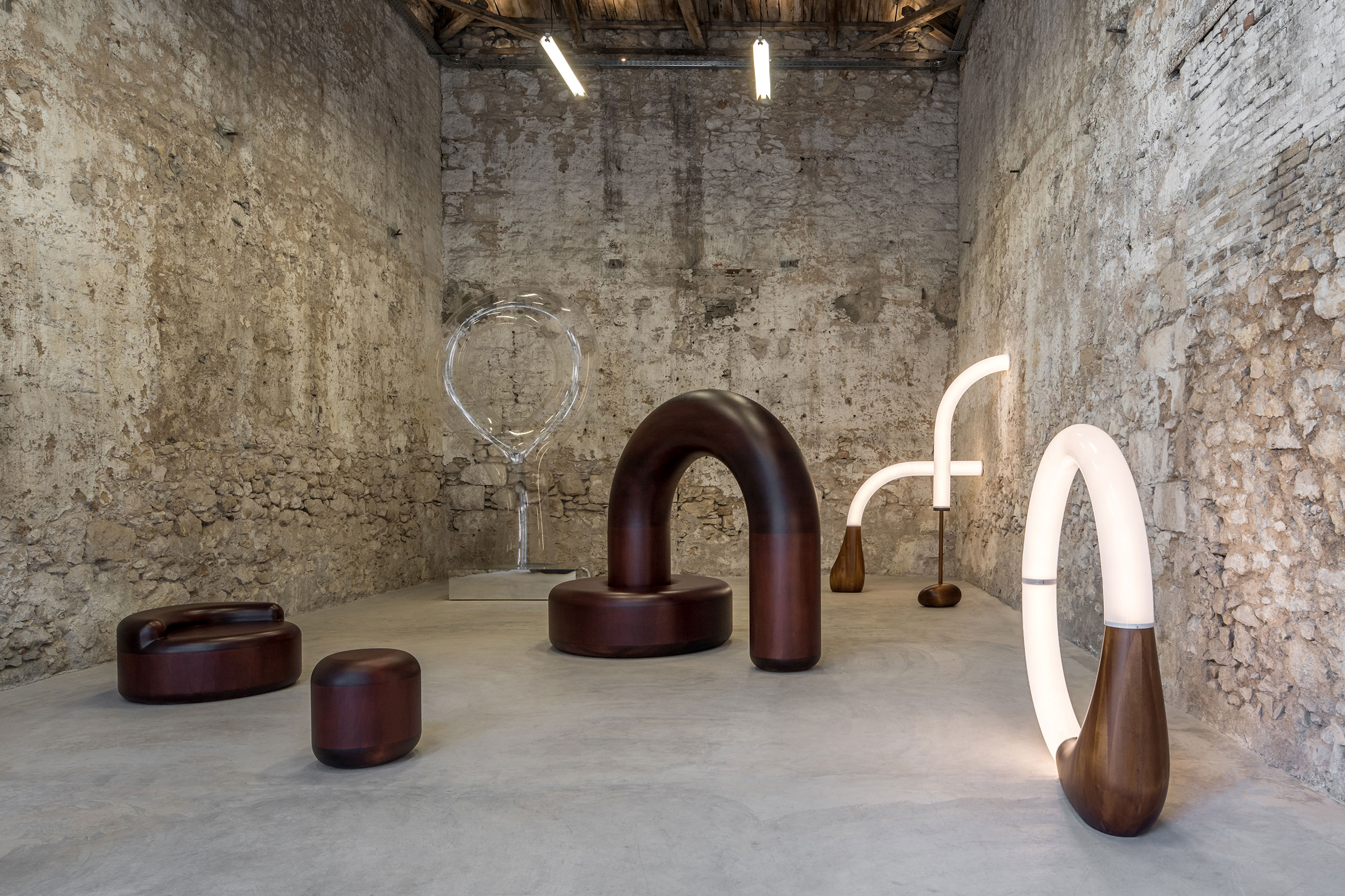
Installation view. VOLAX at Carwan Gallery, Athens. Photography by Giorgos Sfakianakis.
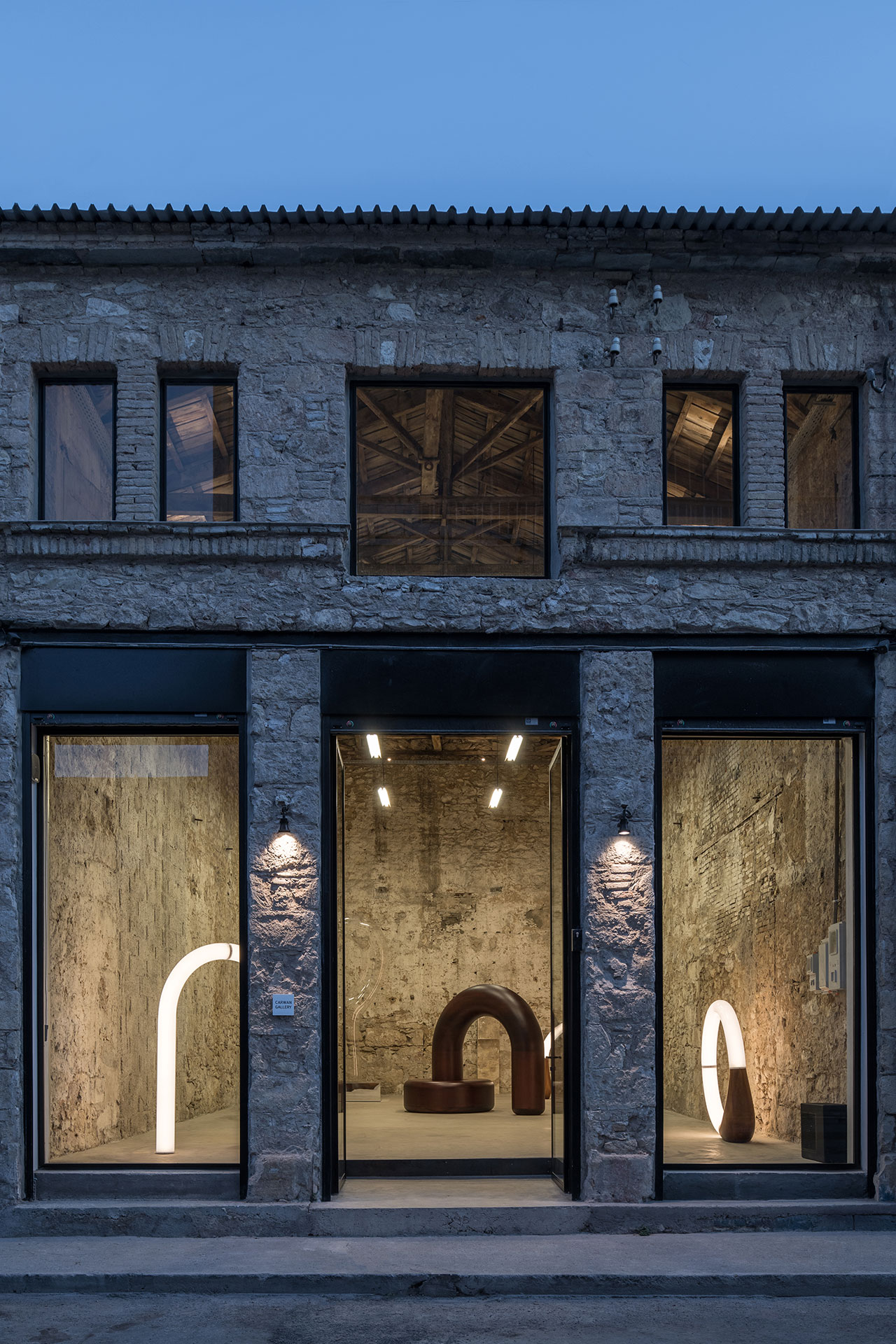
Installation view. VOLAX at Carwan Gallery, Athens. Photography by Giorgos Sfakianakis.














